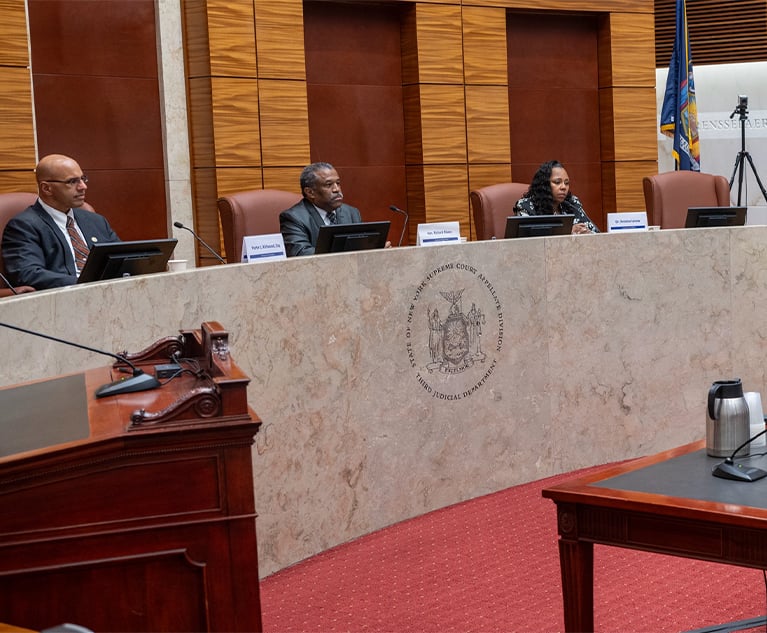Remote Work Is a No-Brainer for This Legal Employer: The Morning Minute
The news and analysis you need to start your day.
July 27, 2021 at 06:00 AM
5 minute read
Want to get this daily news briefing by email? Here's the sign-up.
WHAT WE'RE WATCHING
LITIGATION LATERAL-PALOOZA - We've written plenty in this space recently about how corporate associates are the rock stars of the current lateral market. But, as Law.com's Justin Henry reports, litigators are stepping into the limelight now as well. "Think about the perfect storm that is happening right now," Dan Rhynhart, Blank Rome's litigation department chairman, said. "You have the courts getting comfortable with remote trials, at least bench trials, and they're starting to schedule jury trials again. They're trying to move their dockets along. And then you've got a new administration in government so you've got enforcement coming back." Rhynart added, "Now that the litigation is going gangbusters, there's a real need for associates."
APPEALS FOR FLEXIBILITY - Law firm leaders may be up nights fretting over how to handle office returns, but not everyone is losing sleep over remote work flexibility. As Law.com's Cedra Mayfield reports, the Court of Appeals of Georgia, led by Presiding Judge Stephen Dillard, is preparing for in-person oral arguments to resume in September but has no plans to fully abandon working form home. When Dillard himself opted to modify his commute to include two remote workdays, he extended the option to his staff attorneys, long before the pandemic. Now, that arrangement is set to continue. "My view was, 'if I'm not there, I don't see any reason why [my staff attorneys] can't work from home,'" Dillard said. "We work hard but there's no reason why I can't be flexible with my staff and where they work." And lawyers like central staff attorney Ave Mince-Didier say they appreciate the measure. "The court's telecommute policy has always been very liberal and wonderful," said Mince-Didier, who's worked with the intermediate appellate court for nearly two years. "As a parent, for me personally, it makes it easier to get the kids from school and get them home."
CELL LOW? - Stanley L. Garnett and Carrie E. Johnson of Brownstein Hyatt Farber Schreck have stepped in as defense counsel to radiopharmaceutical drug developer Cell>Point and its founders Greg R. Colip and Terry A. Colip in a pending SEC enforcement action. The complaint, filed June 10 in Colorado District Court, accuses the defendants of misleading investors regarding the status of the company's clinical trials. The case, assigned to U.S. District Judge Philip A. Brimmer, is 1:21-cv-01574, U.S. Securities and Exchange Commission v. Cell>Point, LLC et al. Stay up on the latest deals and litigation with the new Law.com Radar.
EDITOR'S PICKS
- Y Don't U Call Me Anymore?: GCs Want to Hear From Their Law Firms By Phillip Bantz
- Rapid Innovation Is Scary, But Necessary for Law Firm Leaders By Marcie Borgal Shunk
WHILE YOU WERE SLEEPING
MISSED TARGETS - Setting diversity targets has become a common practice across the legal industry in recent years, as law firms attempt to demonstrate their commitment to making changes within their ranks as a sign to clients and rivals alike. Actually hitting those targets, however, is much less common. Research by Law.com International has uncovered over a dozen examples of historical missed targets, as well as future aims which at this point appear almost impossible to obtain. As Law.com International's Simon Lock reports, more firms have fallen short of their diversity goals since 2009 than have met them. While there have been notable success stories, the research highlights that many firms set eye-catching long-term targets, hoover up positive press and industry coverage and then quietly move on when the targets are later missed. Top firms including Hogan Lovells, Linklaters, Freshfields Bruckhaus Deringer and Norton Rose Fulbright have all missed at least one diversity target while others hang in the balance. "We've known for a while that targets don't take us far enough precisely because they do not address the underlying structural barriers to becoming an equity partner which is where the decisions are made in partnerships," said Dana Denis-Smith, CEO of Obelisk Support and the founder of First 100 Years, a project focused on celebrating the journey of women in the legal profession.
WHAT YOU SAID
"We're still anxious about 'perceived weakness,' the best ways to disclose disability to employers and managers, and a real salary disparity for entering disabled lawyers."
This content has been archived. It is available through our partners, LexisNexis® and Bloomberg Law.
To view this content, please continue to their sites.
Not a Lexis Subscriber?
Subscribe Now
Not a Bloomberg Law Subscriber?
Subscribe Now
NOT FOR REPRINT
© 2025 ALM Global, LLC, All Rights Reserved. Request academic re-use from www.copyright.com. All other uses, submit a request to [email protected]. For more information visit Asset & Logo Licensing.
You Might Like
View All
'Reluctant to Trust'?: NY Courts Continue to Grapple With Complexities of Jury Diversity

Ex-SDNY Clerk Can't Convince 2nd Circuit That Bribery Sentence Was Improper
3 minute read
Who Are the Judges Assigned to Challenges to Trump’s Birthright Citizenship Order?

Senator Plans to Reintroduce Bill to Split 9th Circuit
Law Firms Mentioned
Trending Stories
- 1Public Notices/Calendars
- 2Wednesday Newspaper
- 3Decision of the Day: Qui Tam Relators Do Not Plausibly Claim Firm Avoided Tax Obligations Through Visa Applications, Circuit Finds
- 4Judicial Ethics Opinion 24-116
- 5Big Law Firms Sheppard Mullin, Morgan Lewis and Baker Botts Add Partners in Houston
Who Got The Work
J. Brugh Lower of Gibbons has entered an appearance for industrial equipment supplier Devco Corporation in a pending trademark infringement lawsuit. The suit, accusing the defendant of selling knock-off Graco products, was filed Dec. 18 in New Jersey District Court by Rivkin Radler on behalf of Graco Inc. and Graco Minnesota. The case, assigned to U.S. District Judge Zahid N. Quraishi, is 3:24-cv-11294, Graco Inc. et al v. Devco Corporation.
Who Got The Work
Rebecca Maller-Stein and Kent A. Yalowitz of Arnold & Porter Kaye Scholer have entered their appearances for Hanaco Venture Capital and its executives, Lior Prosor and David Frankel, in a pending securities lawsuit. The action, filed on Dec. 24 in New York Southern District Court by Zell, Aron & Co. on behalf of Goldeneye Advisors, accuses the defendants of negligently and fraudulently managing the plaintiff's $1 million investment. The case, assigned to U.S. District Judge Vernon S. Broderick, is 1:24-cv-09918, Goldeneye Advisors, LLC v. Hanaco Venture Capital, Ltd. et al.
Who Got The Work
Attorneys from A&O Shearman has stepped in as defense counsel for Toronto-Dominion Bank and other defendants in a pending securities class action. The suit, filed Dec. 11 in New York Southern District Court by Bleichmar Fonti & Auld, accuses the defendants of concealing the bank's 'pervasive' deficiencies in regards to its compliance with the Bank Secrecy Act and the quality of its anti-money laundering controls. The case, assigned to U.S. District Judge Arun Subramanian, is 1:24-cv-09445, Gonzalez v. The Toronto-Dominion Bank et al.
Who Got The Work
Crown Castle International, a Pennsylvania company providing shared communications infrastructure, has turned to Luke D. Wolf of Gordon Rees Scully Mansukhani to fend off a pending breach-of-contract lawsuit. The court action, filed Nov. 25 in Michigan Eastern District Court by Hooper Hathaway PC on behalf of The Town Residences LLC, accuses Crown Castle of failing to transfer approximately $30,000 in utility payments from T-Mobile in breach of a roof-top lease and assignment agreement. The case, assigned to U.S. District Judge Susan K. Declercq, is 2:24-cv-13131, The Town Residences LLC v. T-Mobile US, Inc. et al.
Who Got The Work
Wilfred P. Coronato and Daniel M. Schwartz of McCarter & English have stepped in as defense counsel to Electrolux Home Products Inc. in a pending product liability lawsuit. The court action, filed Nov. 26 in New York Eastern District Court by Poulos Lopiccolo PC and Nagel Rice LLP on behalf of David Stern, alleges that the defendant's refrigerators’ drawers and shelving repeatedly break and fall apart within months after purchase. The case, assigned to U.S. District Judge Joan M. Azrack, is 2:24-cv-08204, Stern v. Electrolux Home Products, Inc.
Featured Firms
Law Offices of Gary Martin Hays & Associates, P.C.
(470) 294-1674
Law Offices of Mark E. Salomone
(857) 444-6468
Smith & Hassler
(713) 739-1250









